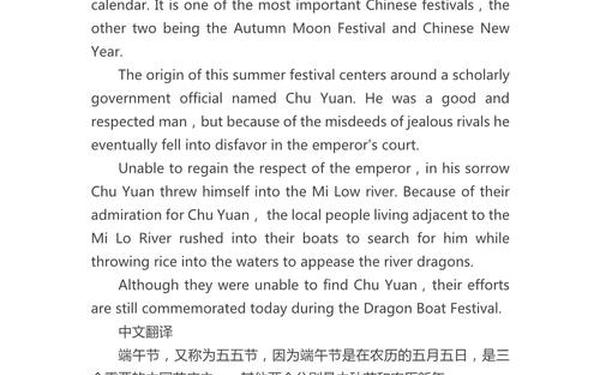Dragon Boat Festival: A Traditional Chinese Celebration
The Dragon Boat Festival (端午节), also known as Duanwu Festival, is one of China’s oldest and most cherished cultural traditions. Celebrated on the fifth day of the fifth lunar month (usually in June on the Gregorian calendar), it combines historical legends, vibrant customs, and symbolic foods. Below is a comprehensive introduction to this festival, suitable for an English essay.
1. Origins and Legends
The festival’s origins are rooted in multiple legends, but the most famous commemorates Qu Yuan (屈原), a patriotic poet of the Warring States Period (475–221 BC). Qu Yuan, disillusioned by political corruption and the fall of his state, drowned himself in the Miluo River. To honor him, locals raced boats to scare away fish and threw zongzi (sticky rice dumplings) into the water to prevent them from eating his body . Another legend involves Wu Zixu, a loyal official, and Cao E, a filial daughter who sacrificed herself to retrieve her father’s body from a river .
2. Key Traditions
a) Dragon Boat Races
The most iconic activity is dragon boat racing, where teams paddle ornately decorated boats to the rhythm of drums. This tradition symbolizes the rescue attempts for Qu Yuan and fosters teamwork and community spirit .
b) Eating Zongzi

Zongzi, pyramid-shaped dumplings made of glutinous rice wrapped in bamboo leaves, are the festival’s signature food. They can be filled with ingredients like pork, beans, or salted egg yolk, reflecting regional variations .
c) Protective Customs
3. Cultural Significance
The Dragon Boat Festival embodies filial piety, patriotism, and harmony with nature. It also aligns with the summer solstice, emphasizing health practices to combat seasonal diseases. In 2009, UNESCO recognized it as part of the Intangible Cultural Heritage of Humanity, highlighting its global cultural value .
4. Modern Celebrations
Today, the festival blends tradition with modernity. Families gather to make zongzi, watch dragon boat races, and enjoy outdoor activities. In regions like Taiwan, it is a public holiday with extended festivities, including parades and cultural exhibitions .
Sample Essay Conclusion
The Dragon Boat Festival is more than a historical commemoration; it is a living tradition that connects generations. Through its rich legends, delicious foods, and lively customs, it teaches values of loyalty, resilience, and community. As the drums of dragon boats echo across rivers, the spirit of Qu Yuan and the wisdom of ancient China continue to inspire the world.
References:
This essay structure allows flexibility—you can expand on specific sections (e.g., personal experiences making zongzi) or focus on cultural comparisons. Let me know if you need further details!

